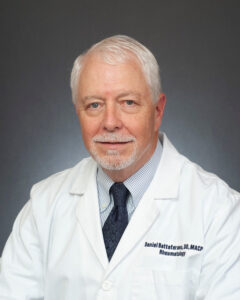The ACR recently created a new standing committee devoted to addressing long-term workforce solutions in rheumatology, the ACR Workforce Solutions Steering Committee. At its helm is Daniel F. Battafarano, DO, MACP, MACR.

Dr. Battafarano
Dr. Battafarano brings more than 35 years of leadership and experience in graduate medical education (GME) in rheumatology and internal medicine to the post. He holds multiple academic positions: adjoint professor of medicine at the University of Texas Health and University of the Incarnate Word College of Osteopathic Medicine, both in San Antonio, and professor of medicine at the Uniformed Services University of the Health Sciences, Bethesda, Md. For 15 years, he served as civilian chair and professor of medicine for the Rheumatology Service at Brooke Army Medical Center (BAMC), Fort Sam Houston, Texas. A room at BAMC—the Colonel Daniel F. Battafarano Education Conference Room—was dedicated to him in honor of his many contributions to medical education.
Here, Dr. Battafarano describes the goals of the ACR Workforce Solutions Steering Committee, his plans for the committee over the next few years and why he chose rheumatology as a specialty.
The Rheumatologist (TR): What does the Workforce Solutions Committee do?
Dr. Battafarano: The ACR Workforce Solutions Committee’s mission is to innovate and implement workforce solutions to train and sustain high-quality adult and pediatric rheumatology care in underserved communities, while partnering with local stakeholders. The committee includes a diverse group of multidisciplinary members.
The ACR Board of Directors approved the task force’s recommendations in October 2021 to pursue five primary interventions to address workforce shortages in the most underserved rheumatology regions of the U.S.: the Northwest, Southwest and south-central regions. These interventions include 1) promoting new fellowship programs and training primary care providers; 2) enhancing recruitment opportunities from medical students to practice options; 3) fostering patient-centered communities with regional stakeholders; 4) integrating virtual training programs to support multidisciplinary rheumatology teams; and 5) promoting training and research grants to financially support these underserved regions. More than 50 ACR/ARP volunteers plus a team of workforce consultants are leading and supporting these initiatives, and we are working collaboratively with other ACR committees to facilitate workforce solutions.
TR: What are your plans and goals for the committee over the next year or two?
Dr. Battafarano: The ACR and the Rheumatology Research Foundation are collaborating on financial strategies to support long-term workforce solutions and initiatives for rheumatology care. Many of these initiatives fall under the umbrella of the five primary interventions listed above. We recently held a call with GME leadership from 10 institutions with current resident programs in the Northwest, Southwest and south-central who have expressed interest in establishing or expanding rheumatology fellowships. The programs are at various decision-making points, and we anticipate working with them in the coming months to grow fellowships in these underserved areas.
We are also working to expand rheumatologic services via our virtual rheumatology training modules supported by virtual training grants. These ACR modules can be utilized by people in any region of the U.S. and will target multidisciplinary teams that include primary care providers, advanced practice providers, physical therapists, occupational therapists and pharmacists. We are facilitating grand rounds for internal medicine, pediatric and family medicine residents in these regions for education and to recruit future rheumatologists. There is an additional need to optimize telemedicine/telehealth care with training for the rheumatology community.
Recently, we supported the preparation of a draft of a white paper, titled The Value of Rheumatology, which provides strong support for the expansion of rheumatology. The white paper report will dramatically help justify the need for and value of rheumatology for recruitment efforts among medical students and residents and healthcare organizations. Furthermore, the white paper will enhance continued discussions with insurance payers regarding value-based rheumatology care models at our Payer Summit in 2023. We anticipate release of the white paper later this year.
TR: How did you get involved with the committee, and how did this lead to you becoming chair?
Dr. Battafarano: I was instrumental in the design of the 2015 ACR Adult and Pediatric Workforce studies and co-author on the corresponding publications. In 2021, the ACR president sought my advice for ACR workforce solutions and asked me to lead and provide vision to the ACR regarding potential workforce strategies. I formed a small visionary group and we presented our recommendations to the ACR Board of Directors in October of 2021. The ACR supported our vision and subsequently created a new ACR committee to address long-term workforce solutions with interventions.
TR: On a more personal note, how did you get into rheumatology as a career?
Dr. Battafarano: After completing an internal medicine residency at BAMC and practicing three years in a 160-bed hospital in Nuremburg, Germany, I completed a rheumatology fellowship under Sterling West, MD, at Fitzsimons Army Medical Center in Aurora, Colo. Rheumatology provided me with a clinical immunology career and long-term patient relationships. I served for 21 years in the Army as a clinical and academic rheumatologist and in various leadership roles, including associate dean for over 40 GME programs in the Army and Air Force. After retiring at the rank of colonel in 2004, I continued as a civilian rheumatology professor at BAMC, serving as division director, research director, and program director for an Adult U.S. Air Force/Army Rheumatology Fellowship until 2019; four of our fellows were recognized with ACR Distinguished Fellow Awards. I then provided underserved rheumatology care at CommuniCare Health Center until June 2022, when I had to resign for significant family responsibilities.
TR: What motivates your involvement in the ACR, and what would you say to your colleagues about its rewards and challenges?
Dr. Battafarano: I strive to serve and give back to the community with a blend of gravitas and levitas through patient care, teaching, clinical research and leadership. The ACR has given me opportunities to share my passion for the rheumatology missions. My various professional experiences enable me to live in the present and provide ACR leadership that supports training, research and compassionate care for all patients. For me, nothing is more rewarding than the soulful experience of the doctor-patient relationship and medical professor-mentor roles that motivate me to write humanities essays.
Mary Beth Nierengarten is a freelance medical journalist based in Minneapolis.


